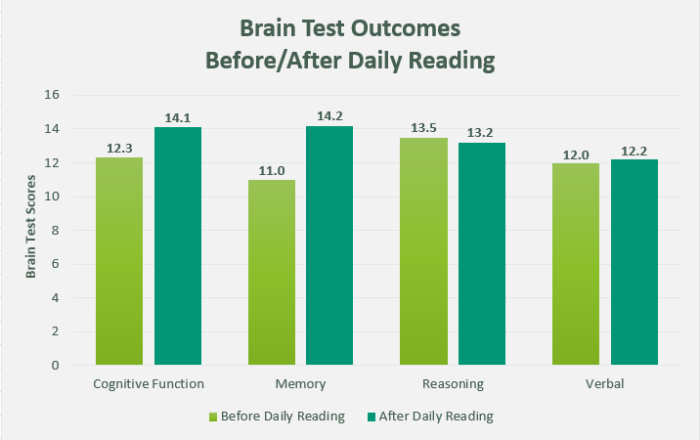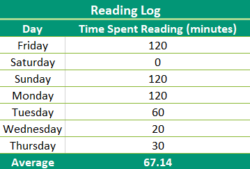“A reader lives a thousand lives before [s]he dies…The [wo]man who never reads lives only one.”
– George R.R. Martin
══════════════════
 I’ve always wanted to be smarter. I’ve often admired those who are quick on their feet and can learn quickly. Did you ever have those annoying classmates that barely needed to study before an exam? While impressed by them, I definitely turned a little green knowing they were already in bed or hanging out with friends while I was up late in the library trying to cram biology facts into my brain.
I’ve always wanted to be smarter. I’ve often admired those who are quick on their feet and can learn quickly. Did you ever have those annoying classmates that barely needed to study before an exam? While impressed by them, I definitely turned a little green knowing they were already in bed or hanging out with friends while I was up late in the library trying to cram biology facts into my brain.
It’s easy to forget just how big of a deal our brains are. Like, a big effing deal. And it’s not just about intelligence, it’s about brain health. What we can do with our brain impacts every aspect of our life. How long we’ll live, what kind of job we’ll get, our relationships, and physical health just to name a few. Our brain carries us through life. So can we help it, help us by making it stronger? It’s clear that having a brain full of knowledge, intelligence, and wisdom can unlock many doors for us. But where do we find these keys?
According to research, one might just be in the pages of a book.
Reading is often encouraged as something “we all should be doing.” Because, well, it’s good for us. But why? We were told to read for a reason. I mean it makes sense, when we’re reading, our brains are active and learning…right? While there are many complicated factors that impact human intelligence (i.e. access to resources), the act of reading is widely regarded as a beneficial practice for brain functioning.
Reading has been said to improve brain health and abilities such as:
- memory
- vocabulary
- empathy
- social skills
- concentration
- slows cognitive aging
- and reduces risk of Alzheimer’s, dementia, and stress.
- “Reading was proved 68% better at reducing stress levels than listening to music; 100% more effective than drinking a cup of tea; 300% better than going for a walk; and 700% more than playing video games.” – Dr. David Lewis
- “Reading was proved 68% better at reducing stress levels than listening to music; 100% more effective than drinking a cup of tea; 300% better than going for a walk; and 700% more than playing video games.” – Dr. David Lewis
Wow, that’s a lot.
Consistency is key:
Research from the University of Michigan found that 30 minutes a day might be enough to receive long-term benefits from reading.
My Experiment:
But how clear is the connection between reading and intelligence? I wanted to test this out for myself through a very amateur “at-home experiment.”
Here was my procedure:
- Prior to my week of reading, I took an initial “baseline,” brain assessment using the free tests available through Cambridge Brain Sciences of my brain’s verbal, reasoning, and memory abilities.
- For the next week, I read an average of 67 minutes a day. See Table 1 for my exact reading time per day.
- Once the week was over, I took the same brain assessment testing my verbal, reasoning, and memory abilities again through Cambridge Brain Sciences.
My Results:

Alas! There was an increase in my cognitive functioning, memory, and verbal scores. The largest increase was in my memory scores which aligns with previous research.
Interestingly, my reasoning scores decreased. Glad I didn’t have any big decisions to make that week…
Table 1.

Conclusion:
While my experiment has some limitations, my results do support that reading might have an impact on brain functioning, which may lead us to living smarter and healthier lives.
Now that my researcher hat is back on, it would be interesting to understand longer-term impacts of reading on brain functioning. If I were to repeat this experiment over a period of three months, would I see a greater impact? Or, if I were to stop reading consistently for a few weeks, would that affect my brain assessment scores?
Interesting questions to save for a rainy day…
Research Limitations:
There are many limitations to this “at-home experiment.” Some of which are listed down below:
- Repetition effect
- After taking the first round of brain tests, I may have learned how to be better at test-taking. Note: the baseline and outcome tests were not the exact same tests, they only tested the same abilities.
- Mystery third variable
- There could have been another factor that led to changes in my scores (i.e. exercise/meditation/sleep/mood)
- Small sample size
- Since it was just me in the experiment, we cannot generalize these findings to the general population. If more people participated in this experiment, we might be able to observe a pattern in the results
- Speaking of…if you have time to assess your brain, my “Amateur Experiment” has a pretty simple protocol to follow…
How often do you like to read? What types of books do you enjoy reading?
Also by Lindsay: What Happened When I Drank 2L Of Water A Day For 28 Days (Before & After)
Related: These 5 Scientific Benefits Of Reading Will Make You Want To Curl Up, STAT
Get more like this—Sign up for our daily inspirational newsletter for exclusive content!




